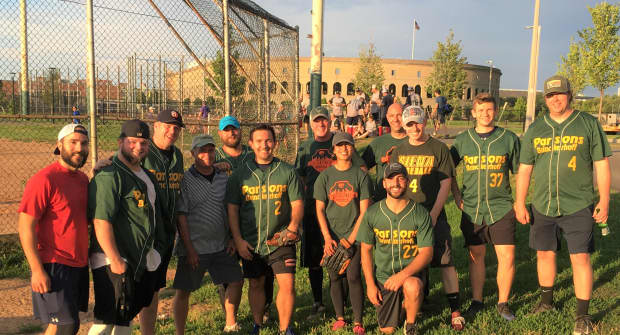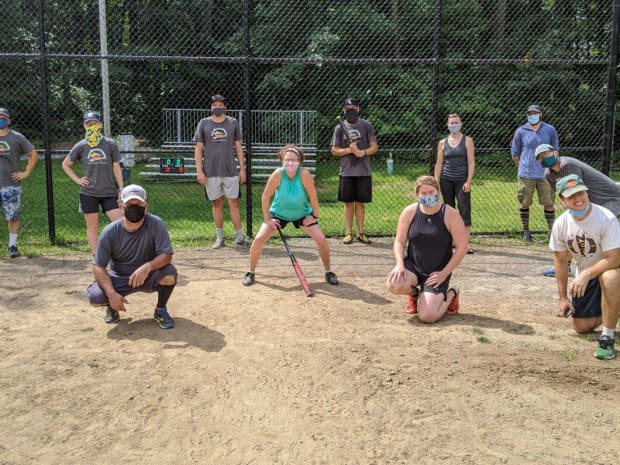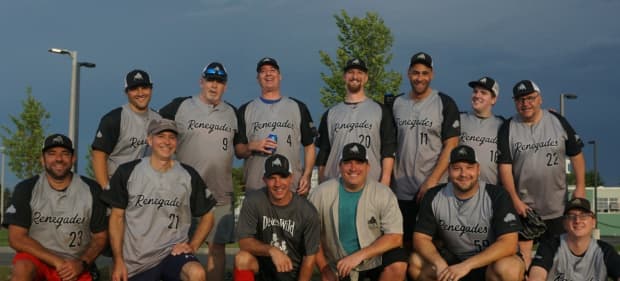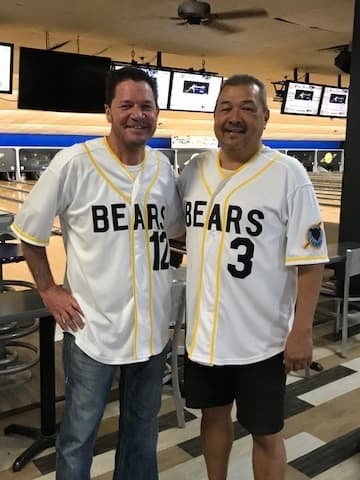This post was originally published on this site
American office workers are moving from the Zoom window to the batter’s box.
When Sean O’Rourke took the field at a softball league on Monday night, he had some work to-do’s he ironed out with teammates face to face, instead of resorting to electronic communication.
“Knowing I’m going to see them at the game, it’s just easier,” said O’Rourke, director of electrical engineering at WSP, a multi-office engineering consulting firm with one location in Boston. He and teammates hashed out shift schedules for an ongoing project in the dugout, he said.
The softball team has been playing for around 15 years, but took last year off. Now, the games are a way to reconnect and talk shop professionally whether between innings or during a post-game drink, O’Rourke said.
The office softball game is being played in parks all over the country again, after a year of being sequestered at home and wondering when, if ever, people would see their colleagues again outside of a Zoom
ZM,
or Google Hangouts
GOOG,
GOOGL,
call.
While frontline workers battled through the pandemic, millions of office workers had the option of staying home. The latter can now experience that in-person camaraderie again, catch up on office politics — at least, the virtual kind — and tell each other whether they got the Moderna
MRNA,
Johnson & Johnson
JNJ,
or Pfizer-BioNTech
PFE,
BNTX,
vaccine.
Rising participation in all types of group sports could be a grand slam for some companies. Last month during an earnings call, Lauren Hobart, president and CEO of Dick’s Sporting Goods
DKS,
told analysts that team sports “came back with a vengeance. Rightly so, because it has been a year or so since people have played.”

Sean O’Rourke, third from left, in a 2019 team photo. This year, O’Rourke uses moments during games to deal with office to-do’s. Photo courtesy Sean O’Rourke.
Dan Goossen has not had in-person office meetings with one of his colleagues in 15 months and it’s been a year since he’s been with several others, but he’s going to be with them this week in his work team’s inaugural softball game.
“We will all be incredibly rusty no doubt, and play terrible. But that’s not the most important part,” said Goossen, who is the director of composting for the Chittenden Solid Waste District, a public entity handling the trash and solid waste in Vermont’s Chittenden County.
The most important part is “just being with colleague and having a fun outdoor activity,” said Goossen — the co-captain, who sometimes pitches and sometimes plays first base for the district’s “Rowdy Recyclers” team.
Goossen fielded a team last year “and it was great, but it was different.” There were rules to sanitize bats between use, for example. He anticipates the upcoming games and their vibe “being so much closer to what it was two years ago.” There’s no bat sanitizing rule this year, he noted.
The imminent face-to-face reunion with some colleagues is a little bit mind-blowing for Goossen — “as is every time we try something new in the post-COVID world, seeing parents, relatives without masks. It’s all happening all the sudden.”
Goossen’s marking the occasion with something special: matching team shirts. “For the first time everybody, hopefully everybody, will be wearing the same shirts.”

A 2020 team photo for the Rowdy Recyclers. Dan Goossen (middle row, far right) expects the 2021 season’s vibe and feeling to be a lot different. Photo courtesy Dan Goossen
It will be the first time Goossen’s teammate, Rhonda Mace, is also seeing some teammates in person and not “on a goofy video screen” since the pandemic’s start.
“It will just be weird to see their whole faces and, in person, give a high five,” said Mace, the district’s school outreach coordinator who’s a self-described “major high fiver.”
She’s ready to sit together in a dugout and be close enough to talk to opposing players when getting on base. That’s different from last year in one crucial way: “You couldn’t chit chat with them, and I love to chit chat.”
So what’s it like being back together again? “It’s basically the talk around the water cooler. But instead of the office it’s on the baseball field,” said O’Rourke, the team coach who’s ready to play whatever spot is necessary.
“Being surrounded by 12 people all playing a game together has actually been fun. It’s kind of a return to normal,” he said.
As pandemic-related restrictions ease and employers weigh plans on how, when and to what extent they will bring back staff, the good ole company softball team — and other types of sports — is taking on special new resonance in some places.
“
‘Knowing I’m going to see them at the game, it’s just easier.’
”
When company management agreed to pay the league fees, O’Rourke noted part of the appeal was an effort at employee engagement. At this point, in-person office capacity is around 30%, he said.
Goossen is part of the Chittenden Solid Waste District’s wellness committee, which has tried to boost morale during this tough time.
Earlier in the pandemic, the committee arranged some online games for the approximately 60 staffers. Just over half are in jobs that cannot be accomplished remotely while the remainder are administrative jobs. “We got a little bit of participation. It was better than nothing,” he said.
Now the Rowdy Recyclers have approximately 16 people on their roster, Goossen said. “Softball is the big one for many of us.” The committee’s funds paid the $600 for league registration and $280 for the tee-shirts.

John Roche, standing, third from left, in a 2019 team photo for the Motor Pool Renegades. The team didn’t play last year and Roche worried if the team didn’t come together in 2021, ‘we’d never get back again.’ Photo courtesy John Roche
Camaraderie on the field
Team building and stronger relationships have always been part of what companies are looking for when they sign up sports teams, said Robert Kinsler, founder and CEO of United Fray, the parent company of operations running various sports leagues and social events in Phoenix, Ariz., Jacksonville, Fla. and Washington D.C.
Talking with corporate clients who are pulling together teams, Kinsler said there’s new momentum, “given that a lot of people have been cooped up.” Many people are itching to get out and enjoy life this summer as both temperatures and vaccination rates rise.
Kinsler didn’t have a breakdown of how many companies are waiting to regroup, and how many are playing. It’s “a mixed bag,” he said.
It’s not a one-size-fits-all jersey. There are many places where businesses aren’t rushing to field sports squads. Return to office plans may have bigger priorities than after-hour sports, and many workers may not be ready to resume office life as they knew it — let alone play games off the clock.
Most businesses within the Fort Worth Hispanic Chamber of Commerce haven’t yet resumed the types of after-hours sports leagues they used to have before the pandemic, according to Michael Dimas, the organization’s immediate past president. “It’s just an abundance of caution,” he said.
Play hasn’t stopped altogether. One chamber member, Quorum Architects, had a bowling tournament outing this week, Patty Potter, the firm’s marketing director, said. “Everyone was giddy with excitement, and we felt like kids who’d been let out for recess,” she said.
Dimas, an avid bowler with one perfect 300 game during decades of league play, could have showed them a thing or two. At a time when his office work is remote, he’s bowled with two other co-workers in a Wednesday night league.

Michael Dimas, right, said getting back to his bowling league “was good to get back to some kind of normalcy.” Photo courtesy Michael Dimas
The four-person league team isn’t through work, said Dimas, customer operations executive at Oncor, a Texas utility company. That doesn’t stop him and teammates from talking about work — but also sports, including the status of Dimas’ classic 1971 Chevrolet
GM,
Nova and how they fared in 2020.
The pandemic initially shut down lanes, but play resumed in September. “It was good to get back to some kind of normalcy,” Dimas said.
“
‘Not being able to connect with people was really hard.’
”
The slow return is seen elsewhere.
Up to half of corporate teams have not resumed play at Game On VT, a Burlington, Vt.-area sports-league operator.
Some of that stems from uncertainty about changing public-health guidelines and also concerns about fielding teams while in-person work was still remote, said Louis Hodgetts, Game On VT’s founder and owner.
Still, Hodgetts is estimating overall demand will exceed 2019.
That year, approximately 1,000 people played in various leagues. This year, Hodgetts says he’s on pace for 1,200 to 1,500 participants through the end of the year. Sometimes co-workers are forming their own unofficial teams, he noted.
Hodgetts is adding new activities to meet demand. That includes an adult gym class and a cornhole league, in addition to sports like lacrosse and softball (where the Rowdy Recyclers will play).
Hodgetts ran leagues last year, but at far lower capacity. “We are a very social species and not being able to connect with people was really hard,” he said.
Playing like it’s 2019
At Hub Sports Boston, Aidan Verre, manager of player experience and sales, sees rising demand. The company’s spring league sales figures are just 5% what they were two years ago, he said. “We are finally getting back to where we were in 2019.”
There are around 30 to 40 company teams in the Boston league playing across all sports, which include basketball, flag football, soccer and softball.
Right now, the engineers and contractors’ softball league — where O’Rourke’s team plays — is the only corporate league that’s back. A league for Boston-area restaurants and another for hotels is on hold, Verre said.
“
‘We figured if we went another year without playing, we’d never get back again.’
”
Like elsewhere, Boston’s leisure and hospitality sector has been hit hard by shutdown orders, and fewer travelers and diners. “Those two leagues are definitely going be hard, with the amount of layoffs,” said Verre.
However, rising vaccination rates and more business increasing productivity should propel those leagues back into play, he added.
Back in Massachusetts, one longtime team just wanted to make it back, with or without the vengeance.
One of the teams in O’Rourke’s league is the Motor Pool Renegades, a conglomeration of acquaintances workers and onetime workers at places including Massachusetts Highway Authority and the Massachusetts Bay Transportation Authority.
John Roche, 60, the coach — and sometimes pitcher and shortstop — for a team that goes back to 1992, said COVID-19 forced a break last year. “We figured if we went another year without playing, we’d never get back again.”
Roche, who retired from the Massachusetts Bay Transportation Authority five years ago, was worried when roster numbers looked skimpy earlier this year. Now they have 16 members on the team.
He is happy they mustered a team. He remembered the first game back. “Just going out and feeling like a little kid again, it felt great,” he said. “All kinds of smiles all around.”

